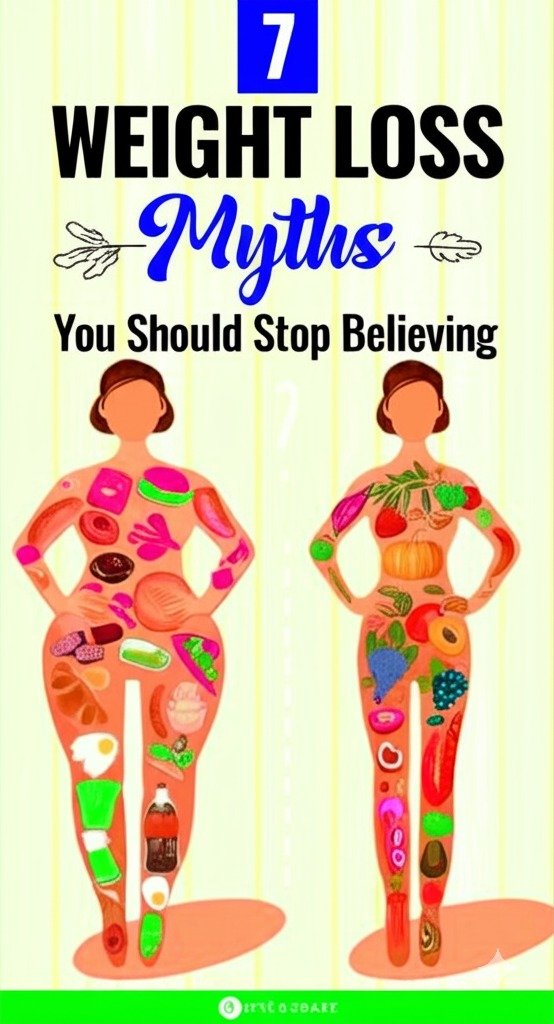
The journey to a healthier weight is often paved with well-intentioned but ultimately misleading advice. In a world saturated with quick-fix solutions and fad diets, it’s easy to get caught up in weight loss myths that can hinder your progress and even harm your well-being. It’s time to cut through the noise and focus on evidence-based strategies.
This blog post tackles the 7 biggest weight loss myths you should stop believing right now, empowering you with accurate information to achieve sustainable and healthy weight management.
Why Debunking Myths is Crucial for Weight Loss Success:
Believing in these common misconceptions can lead to:
- Frustration and discouragement: When following flawed advice doesn’t yield results, it’s easy to lose motivation.
- Unhealthy practices: Some myths promote restrictive diets or unsustainable habits that can be detrimental to your health.
- Wasted time and effort: Focusing on ineffective strategies diverts your energy from what truly works.
- Negative self-image: Feeling like a failure despite your efforts can damage your relationship with food and your body.
Let’s shatter these misleading beliefs and pave the way for a healthier, more informed approach to weight loss.
The 7 Biggest Weight Loss Myths Exposed:
1. Myth: Crash Diets are the Fastest Way to Lose Weight.
- The Allure of Speed: The promise of rapid weight loss through severely restrictive diets is tempting. Who wouldn’t want to see quick results?
- The Harsh Reality: While the scale might show a significant drop initially, this is primarily due to the loss of water weight and precious muscle mass. Fat loss, the actual goal of sustainable weight management, is a much slower process.
- The Downside: Crash diets are notoriously difficult to maintain, leading to feelings of deprivation, intense cravings, and ultimately, a high likelihood of failure and weight regain (often more than what was initially lost – the dreaded yo-yo effect). Furthermore, they can disrupt your metabolism, making future weight loss even harder, and can lead to nutrient deficiencies, fatigue, and irritability.
- The Healthy Alternative: Focus on creating a sustainable calorie deficit through a balanced diet of whole foods and regular physical activity. Aim for a gradual weight loss of 1-2 pounds per week, which is more likely to be maintained long-term.
- SEO Keywords: crash diet, fast weight loss, rapid weight loss, unsustainable weight loss, yo-yo dieting, metabolism slow down.
2. Myth: You Need to Cut Out All Carbs to Lose Weight.
- The Carbophobia Epidemic: Carbohydrates have unfairly become the villain in many weight loss narratives.
- The Biological Truth: Carbohydrates are the body’s primary source of energy. Eliminating them entirely can lead to fatigue, brain fog, and an imbalance in your overall nutrition.
- The Nuance: The key lies in understanding the difference between simple and complex carbohydrates. Refined carbs (white bread, sugary drinks, processed snacks) offer little nutritional value and can contribute to weight gain. However, complex carbs (whole grains, fruits, vegetables, legumes) are packed with fiber, vitamins, and minerals, promoting satiety and providing sustained energy.
- The Balanced Approach: Choose whole, unprocessed carbohydrate sources and enjoy them in moderation as part of a balanced diet that also includes protein and healthy fats.
- SEO Keywords: cut carbs, no carbs diet, carbohydrate restriction, low carb diet, healthy carbs, complex carbohydrates, balanced diet.
3. Myth: Fat Makes You Fat.
- The Misguided Logic: It seems intuitive – eat fat, gain fat. However, the science is more nuanced.
- The Crucial Distinction: Not all fats are created equal. Saturated and trans fats, often found in processed foods and fatty meats, can contribute to weight gain and increase the risk of heart disease.
- The Power of Healthy Fats: Monounsaturated and polyunsaturated fats, found in avocados, nuts, seeds, olive oil, and fatty fish, are essential for various bodily functions, including hormone production, nutrient absorption, and cell health. They can also promote feelings of fullness, helping you eat less overall.
- The Smart Choice: Incorporate healthy fats into your diet in moderation while limiting your intake of unhealthy fats.
- SEO Keywords: fat makes you fat, dietary fat, healthy fats, unsaturated fats, saturated fats, trans fats, fat for weight loss, satiety.
4. Myth: Skipping Meals Helps You Lose Weight Faster.
- The Appeal of Restriction: The idea of consuming fewer calories by skipping a meal seems logical on the surface.
- The Physiological Rebound: When you skip meals, your body senses a lack of energy and can trigger a “starvation response,” leading to a slower metabolism as it tries to conserve calories.
- The Behavioral Consequence: Extreme hunger often follows meal skipping, making you more likely to overeat during your next meal, potentially consuming more calories than you would have if you had eaten regularly.
- The Sustainable Strategy: Aim for three balanced meals and potentially healthy snacks throughout the day to maintain stable blood sugar levels, prevent excessive hunger, and support a healthy metabolism.
- SEO Keywords: skipping meals weight loss, starvation mode, metabolism, overeating, balanced meals, regular eating habits.
5. Myth: You Need to Spend Hours at the Gym Every Day to Lose Weight.
- The Time Barrier: The thought of dedicating hours to the gym can be daunting and unrealistic for many people.
- The Efficiency of Consistency: Consistency and intensity are far more crucial than the sheer duration of your workouts. Even shorter, more frequent bursts of exercise can be highly effective for weight loss and improving overall fitness.
- The Power of Everyday Movement: Incorporating more physical activity into your daily routine – taking the stairs, walking or cycling for short distances, doing household chores – can significantly contribute to your calorie expenditure.
- The Enjoyment Factor: Finding activities you genuinely enjoy makes exercise sustainable in the long run. It doesn’t have to be grueling hours at the gym.
- SEO Keywords: hours at the gym, excessive exercise, workout duration, workout intensity, sustainable exercise, physical activity for weight loss, daily movement.
6. Myth: All Calories Are Created Equal.
- The Simplistic View: The basic principle of weight loss involves burning more calories than you consume. However, focusing solely on calorie counting can be misleading.
- The Nutritional Context: 100 calories from a nutrient-poor source like sugary soda will have a drastically different impact on your body compared to 100 calories from a nutrient-dense food like broccoli. The latter provides fiber, vitamins, and minerals that support satiety, regulate blood sugar, and contribute to overall health.
- The Hormonal Impact: Different foods affect your hormones differently, influencing hunger, metabolism, and fat storage.
- The Wise Choice: Prioritize whole, unprocessed foods that are rich in nutrients, even if they have the same calorie count as less healthy options.
- SEO Keywords: all calories equal, calorie quality, nutrient-dense foods, empty calories, food quality weight loss, healthy eating, balanced nutrition.
7. Myth: There’s a Magic Pill or Supplement for Weight Loss.
- The Lure of Effortless Results: The promise of a quick and easy fix in the form of a pill or powder is incredibly appealing.
- The Unproven Reality: The vast majority of over-the-counter weight loss supplements lack robust scientific evidence to support their claims of significant and sustainable weight loss. Many are ineffective, and some can even have harmful side effects.
- The Sustainable Solution: True and lasting weight loss comes from adopting healthy lifestyle changes – a balanced diet and regular physical activity.
- The Professional Guidance: If you’re considering any weight loss aids, it’s crucial to consult with a healthcare professional or registered dietitian who can provide personalized and evidence-based advice.
- SEO Keywords: weight loss pills, weight loss supplements, magic weight loss cure, effortless weight loss, diet pills, weight loss scams, sustainable weight loss.
The Takeaway: Focus on Sustainable Habits, Not Myths.
The journey to a healthier weight is a marathon, not a sprint. By debunking these pervasive weight loss myths, you can arm yourself with accurate information and adopt a more realistic, sustainable, and ultimately more successful approach. Focus on building healthy eating habits, incorporating regular physical activity you enjoy, prioritizing sleep and stress management, and seeking guidance from qualified professionals. Your path to a healthier you should be paved with knowledge and sustainable lifestyle changes, not misleading myths.
(Call to Action): What weight loss myths have you heard or even believed? Share your experiences in the comments below! And if you found this information helpful, share it with others who might be struggling with these misconceptions. Subscribe to our blog for more evidence-based health and wellness tips!

